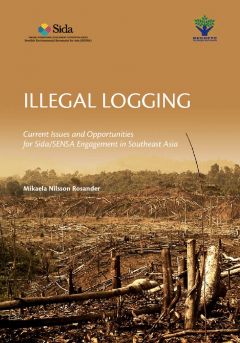Resource information
Illegal logging and its associated trade remains a serious threat to forests and people in Southeast Asia. However, despite having caught the attention of the international community more than a decade ago, the illegal timber trade still accounts for a significant portion of wood and wood products from this region.
Summary
This paper overviews the issues, root causes, and driving forces behind the crimes related to illegal logging, and comprehensively reviews existing initiatives to address the challenges of illegal logging in Southeast Asia. It is the outcome of a collaborative effort between RECOFTC and the Swedish Environmental Secretariat for Asia (SENSA) to explore opportunities for the Swedish International Development Cooperation Agency (Sida) to support and/or initiate regional programs or projects on the issue of illegal logging.
Recommended Entry Points
The following strategies are recommending for designing interventions for addressing legal logging:
- Strengthen social aspects of regional and national FLEG/FLEGT processes, including support for participation and capacity building among local and indigenous people and their representatives
- Support analytical work and information gathering in the region on explicit knowledge gaps mentioned in this study
- Strengthen information sharing, networking, and dialogue among key stakeholders in the region
- Strengthen capacity-building efforts, particularly targeting government staff and the community level
- Support initiatives and processes aiming to clarify tenure arrangements, strengthen local and indigenous people's tenure rights, and promote community involvement in forestry


